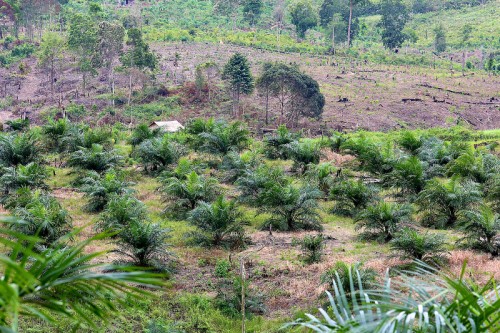
Land cleared for oil palm plantation, East Kalimantan, Indonesia. CIFOR/Mokhamad Edliadi
BOGOR, Indonesia (12 April, 2013) – Norway’s government pension fund – one of the world’s largest – has withdrawn US$ 314 million in investments from a string of companies that it says produce palm oil “unsustainably” – a move environmental advocates are likely to welcome because of links between the industry and deforestation.
Palm oil is found in roughly 50 percent of packaged products on supermarket shelves and interest in using oil palm as a feedstock for biofuel is growing.
Although oil palm can, under optimal conditions, produce more than five times the yield of other vegetable oil crops and is seen by many as a driver of economic development in rural regions, research has shown that its production has encouraged deforestation in South East Asia, resulting in the loss of tens of thousands of hectares of tropical forests.
In March, the Norwegian Government Pension Fund Global released its 2012 Annual Report announcing that it had sold its stakes in 23 of the world’s largest palm oil companies, reducing its investments in the Indonesian and Malaysian palm oil industry by more than 40 percent.
“Several palm oil producers were excluded from the portfolio because their long-term business model was deemed unsustainable,” said the report.
The decision comes in the same year that the fund became a member of the Carbon Disclosure Project, an international not-for-profit organization that “works with market forces to motivate companies to disclose their impacts on the environment.” The organization, which is backed by more than 722 institutional investors representing over US$ 87 trillion in assets, provides investors with information including insight into companies’ greenhouse gas emissions and strategies for managing climate change, deforestation and water.
While Norway has pledged billions of dollars to combatting deforestation through the U.N. mechanism known as REDD+ (Reducing Emissions from Deforestation and forest Degradation), its government pension fund has in the past attracted attention for its investments in the palm oil industry.
The pension fund’s decision is likely, among other factors such as changes in procurement policies and advocacy campaigns, to put more pressure on palm oil producers to consider environmental sustainability more carefully.
The decision to divest was made by Norges Bank Investment Management (NBIM), the fund manager, independently of Council of Ethics investigations into oil palm companies. Earlier decisions also resulted in divestments from tobacco, timber and gold mining companies.
A rise in sustainable and ethical investment
The role of investors in driving environmental best practice has received increasing attention in the past decade, in particular due to sustainability standards developed by the International Finance Corporation (IFC) and the World Bank.
IFC’s Sustainability Framework – which outlines its policies on environmental and social sustainability, performance standards and access to information—was one of the fist environmental and social investment standards to emerge. It has become globally recognised as a benchmark for environmental and social risk management in the private sector.
The World Bank has also developed Environmental, Health, and Safety guidelinesthat its projects must abide by. However an independent evaluation by the IFC has criticised the World Bank for poor compliance with respect to these standards, illustrating how difficult these standards can be to monitor.
A similar safeguard mechanism is the Equator Principles, which is used to determine and manage the social and environmental risks associated with loans and investments that fund large-scale development projects. A number of other multi-stakeholder initiatives designed to support and guide sustainable investment practices have been formed, including the UN backed Principles for Responsible Investment (UNPRI), theNatural Capital Declaration, the OECD-DAC and Basel III.
Several international and commercial banks have signed up to these initiatives, and are now working towards ensuring that the projects they help finance meet stricter environmental and social standards.
What this means for the palm oil industry
Palm oil producers often look to national, commercial banks for funds to expand or create new plantations. However, with some large international banks becoming increasingly environmentally and socially aware, sustainability is playing an increasingly important role in this decision making process.
Ten banks and investment funds have now become members of the Roundtable on Sustainable Palm Oil (RSPO) the dominant certification scheme for palm oil. Although the overall influence of these ten financiers may be limited within the palm oil sector as long as funding can be sourced elsewhere, those palm oil companies who choose to seek funding from RSPO-member banks are now required to become members of the RSPO themselves and commit to plantation certification.
Will other investors follow suit?
The decision by the Norwegian government’s pension fund will certainly contribute to increased pressure on the palm oil producers, but without growing support for sustainability issues from the world’s top three palm oil consumers, India, Indonesia and China, and the banks and investors operating within these countries, these standards may have limited impact.
Evidence suggests that current demand for palm oil will continue to drive new investments and additional land use cover change in Indonesia and Malaysia as well as new growth areas such as North East Brazil, Columbia and Cameroon.
Stakeholders across the palm oil sector will now wait to see if other investors follow suit — whether such investor initiatives will also begin to hold retailers and manufacturers accountable for the palm oil they source, and what impact these initiatives will have on the environmental and social practices of the palm oil industry.

No hay comentarios.:
Publicar un comentario